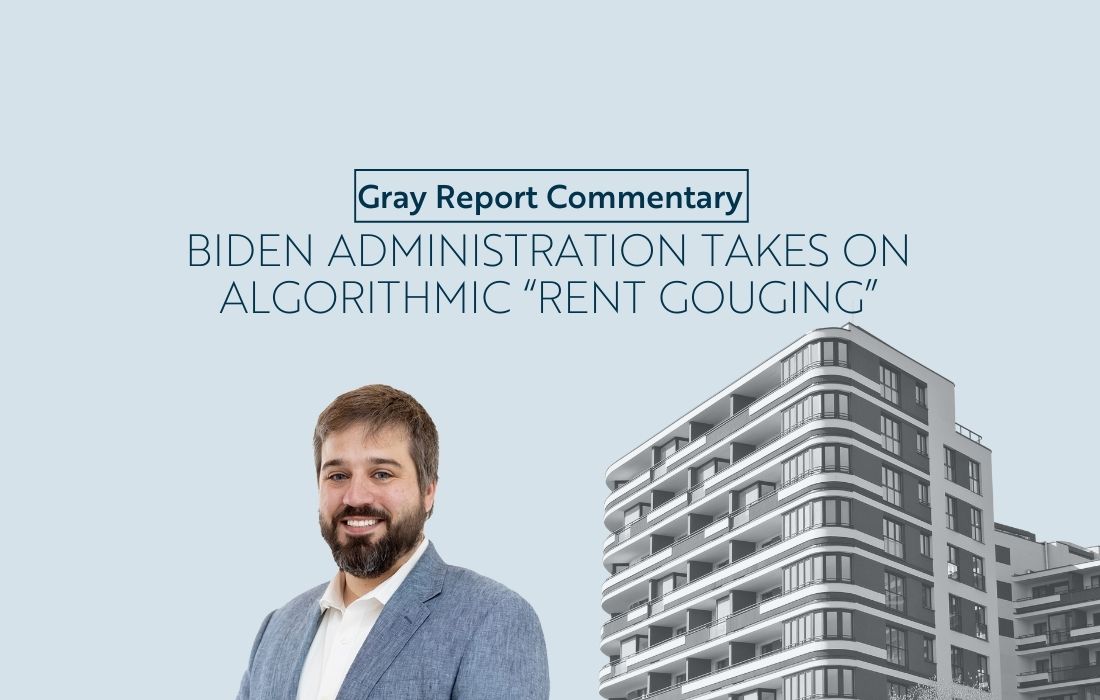
Biden Administration Takes on Algorithmic “Rent Gouging”
Source – CNBC: “Biden targets ‘rent gouging’ landlords as high housing costs factor into 2024 race”

Right up front here, my take on this is that the Biden campaign is lumping rents in with a more generalized critique of corporations raising prices excessively and contributing to inflation.
Getting a little deeper—and if we’re talking about concrete action, this is something to mention here for sure—I think Biden is referencing justice department efforts against RealPage and allegations that RealPage’s rent management software is making it easy for all of the landlords to up their rents at the same time at the expense of renters.
- Biggest issue with that: Rents haven’t grown at all this past year! Oh okay. 0.2%, which is hardly the 5.8% that is reported in rent of primary residence calculations from the CPI. Funny thing is, this 0.2%, which, again, is 29 times lower than CPI-measured rent, this 0.2% number is what RealPage itself recorded!
- Caveat here: We’ve been dismissive of CPI-measured rents, and the issues with accuracy and timeliness are linked to what CPI includes in its measurement, grouping together renewals and new leases and using a market basket of renters that lags other measurements of rent growth by nearly a year and a half.
- RealPage’s numbers, well, I guess you could claim that they are straight-up lying, but I really, really don’t think that they are! Mostly because it wouldn’t make sense to damage their data-gathering reputation so brazenly, and also because RealPage’s numbers are well in line with the many other private rent growth trackers following the apartment market. Zumper, Redfin, Apartment List, Zillow, Yardi Matrix, CoStar, Realtor.com—they’re all showing rent growth that’s well under historical averages.
- Caveat here: We’ve been dismissive of CPI-measured rents, and the issues with accuracy and timeliness are linked to what CPI includes in its measurement, grouping together renewals and new leases and using a market basket of renters that lags other measurements of rent growth by nearly a year and a half.
- But to return to the arguments against RealPage—and I said this in an earlier episode of the Gray Report—I could see a case if rents were moving lockstep in a specific neighborhood, but it falls apart on a national level. The force of American consumer demand (or lack thereof) is far greater than RealPage here. Apartments compete with each other for renters. If an apartment is not getting renters, they lower rents. Apartment units, when you’re looking at them at the scale that RealPage is looking at them, they’re far closer to a commodity than one might think. Does a gas station set gas prices according to what they feel is right at the moment, or do they also use an external system to set the price?
- It’s telling that, in their official White House communication, which we’ll get to here in a second, the administration puts the blame on landlords and property managers. Yes, I know that it’s easy to blindly do what the rent management software tells you to set the rent at, but it’s ultimately the humans that need to be responsible for this.
To get the core of my takeaway from this whole thing, yes, the Biden administration looks like it’s got some concrete plans for housing assistance, some solid ideas for housing supply, but not as much for fixing apartment rents. That being said, I think it is newsworthy that Biden is using this view of excessively high apartment rents in his campaign rhetoric, maybe less as an indication of upcoming regulations and more as a statement of where they Biden administration thinks the public is.
Source – The White House: “FACT SHEET: President Biden Announces Plan to Lower Housing Costs for Working Families”
- $10k to first-time homebuyers or to people selling their first home, some more money to first-gen homebuyers,
- lower closing costs for refinancing and home mortgages (these look more like general goals than specific plans, but it’s a little more weighty than Biden’s campaign remarks earlier this week.) Expanded Low-Income Housing Tax Credit (LIHTEC) “to build or preserve 1.2 million more affordable rental units,”
- a tax credit for building or renovating homes,
- a $20 billion grant fund “as part of as part of his Budget to support communities across the country to build more housing and lower rents and homebuying costs. This fund would support the construction of affordable multifamily rental units; incentivize local actions to remove unnecessary barriers to housing development; pilot innovative models to increase the production of affordable and workforce rental housing; and spur the construction of new starter homes for middle-class families. According to independent analysis, this will create hundreds of thousands of units which will help lower rents and housing costs.” This is a very broad statement and $20 billion dollars is a lot of money. “Pilot innovative models?” “Incentivize local actions?” I want in!
In a more practical world is Biden’s proposal for Fed. home loan banks to 2x their contribution to the affordable housing program, going from 10 to 20%. This would raise an additional $3.79 billion dollars.
Alrighty, here’s the meat of the anti-landlord argument right here: We’ve got “the Strike Force on Unfair and Illegal Pricing,” federal agencies called “to root out corporate behavior that hikes prices on American families through anti-competitive, unfair, deceptive, or fraudulent business practices.” The example used is the Dept. of Justice’s efforts (still-in-progress) and position “that inflated rents caused by algorithmic use of sensitive nonpublic pricing and supply information violate antitrust laws. Earlier this month, the Federal Trade Commission and DOJ filed a joint brief further arguing that it is illegal for landlords and property managers to collude on pricing to inflate rents – including when using algorithms to do so.”
Not just rent management software, they’re aiming at “rental junk fees” as they call them in this official White House fact sheet, citing their progress in an FTC-proposed rule to “ban misleading and hidden fees across the economy, including in housing rental agreements.”
- The example they used here was the HUD policies used in multifamily public housing and voucher programs.
- Application fees, credit report fees, assistance animal fees, security deposits, criminal background check fees, and others that you can find a link to in the description of this episode.
- See, when I think of junk fees, I think, maybe the White House doesn’t like trash collection fees?
Also, White House plans to support tenants’ rights for military service members, offering guidance to local and state governments with the goal of reducing evictions, and “putting together a fact sheet on the rights prospective renters have when screened by housing providers.”
$20 billion dollars! Can we go back to that? I mean, it sounds a lot more vague than the 3.79 billion linked to the proposal for fed. Home loan banks to give more to the affordable housing program, which makes me think that that 20B grant plan is not going to happen.